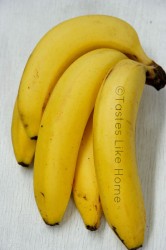Bananas are the world’s most popular and best-selling fruit, outranking the apple and orange. This fact alone is testimony to the importance and nutritional value of bananas in our daily diets. It therefore begs the question, ‘Have you had your banana today?’
I bet that after reading today’s column that you will never look at bananas the same way again.
Bananas & Potassium
Bananas are a rich source of the mineral, potassium. Potassium helps the body to store blood sugar in the form of glycogen, which is the principal source of energy required by all muscles in the body in order to work properly. This is why eating a banana makes for an ideal, and slightly prolonged source of energy.
The high potassium levels in bananas can also help us with stress relief. What the potassium does in our bodies is that it helps normalise the heartbeat and regulate the body’s water balance. Because we live in the tropics, our bodies easily loose potassium through sweating, as such, it is important that we, in particular, eat potassium rich foods of which bananas are a natural source.
 Recent studies have shown that the regular consumption of foods rich in potassium can help lower and control blood pressure. The United States Food and Drug Administration has now given permission for the banana industry to make official claims for the fruit’s ability to reduce the risk of blood pressure and stroke. According to a study in The New England Journal of Medicine, eating bananas as part of a regular diet can reduce the risk of death by strokes by as much as 40 per cent.
Recent studies have shown that the regular consumption of foods rich in potassium can help lower and control blood pressure. The United States Food and Drug Administration has now given permission for the banana industry to make official claims for the fruit’s ability to reduce the risk of blood pressure and stroke. According to a study in The New England Journal of Medicine, eating bananas as part of a regular diet can reduce the risk of death by strokes by as much as 40 per cent.
Bananas & Other Nutrients
Bananas are also good sources of Vitamin B6, folate, and soluble fibre. Vitamin B6 helps the body manufacture the hormone insulin, antibodies that fight infection and certain chemicals that send messages between nerve cells. This vitamin also plays a key role in the production of haemoglobin.
Folate is another of the B vitamins; it is also called folic acid or folacin. Folate cannot be made by the body and must therefore come from the foods we eat. Folate is extremely important; it helps in the making of DNA – the substance that makes up our genes.
Soluble fibre during digestion binds to cholesterol in the stool; when eaten in sufficient quantities, soluble fibre can help reduce the levels of cholesterol in the blood. Fruits are one group of foods that is a good source of soluble fibre and banana is one such fruit.
Bananas & Health Benefits

There are a myriad of other health benefits of bananas being a regular part of our diet. Bananas are said to contain tryptophan, an amino acid that can be converted to serotonin, leading to improved mood.
Bananas contain pectin (yes, that same element necessary when making jams and jellies). Pectin is a soluble fibre and can help normalise movement through the digestive tract.
Research published in the International Journal of Cancer has shown that daily consumption of whole fruits and vegetables, especially bananas is highly protective to kidney health. Results have shown that among the fruits consumed, bananas were especially protective.
If you’re a smoker and you’re thinking of quitting, the B vitamins in bananas can help the body recover from the effects of nicotine withdrawal.
And on the folk side of things, I’ve heard that if you rub the inside of a banana peel on a mosquito bite, it will help reduce itching. The thing is, you might not have a banana around at the same time that you get bitten by a mosquito… still, it shows us how cool the banana is.
A ‘lil banana history
For decades the backbone of the economies of the many of the Organisation of Eastern Caribbean States (OECS), has been built on bananas. It is easy to think then that bananas are originally from the Caribbean. They are not.
Portuguese sailors brought bananas to Europe from West Africa in the early 15th Century. They were considered exotic African fruit. The cultivation and use of bananas date back to ancient times, even pre-dating the cultivation of rice. While the banana thrived in Africa, its origins are said to be of East Asia and Oceania. It was Sailors that took the banana to the Canary Islands and brought them to the West Indies.
In the mid 18th century bananas were imported from the Caribbean to New Orleans, Boston and New York, they were considered, wait for it, such an exotic treat! The bananas were eaten on a plate using a knife and fork!
Bananas Selection & Storage
The first thing to think about when selecting bananas is usage. Do you want the bananas to eat right away? Do you want them to last a few days? If you want them to eat right away then get the ones that are already yellow all over. For others that you might want for the next 3 days, choose those that are still mostly a pale green with hint of cream all over, or, get those that are light yellow with a little green at the top and bottom.
Bananas should be full and plump with the skin smooth. Watch out for those that are bruised and soft. If you see bananas that have a dull grey colour, it means that the banana has been chilled or overheated during storage. Fortunately, we rarely see such bananas in the Caribbean, but it is still important for you to note.
A banana is at its peak of ripeness when you see tiny brown specks have developed. My mum refers to this as speckle banana. She would not touch a banana if it does not have the speckles as she calls them. A ripe banana peels easily and smoothly. If you are unable to easily break the stem at the top of the banana to peel it, then it is not yet ripe. If the skin is difficult to separate from the flesh of the fruit then it is not ripe. Eating an un-ripened banana at this stage can cause digestive problems. In other words, it can hurt your belly.
When you bring home your bananas, place them in a fruit basket or on the counter top away from direct sunlight and heat.
Once peeled, bananas should be eaten immediately. If it is a large banana and you only want to eat half, then wrap the other half in plastic wrap and refrigerate for use the next day. If you like, squirt a little limejuice on the exposed cut part of the banana to prevent discolouration before wrapping and refrigerating it.
If your bananas ripen faster than you expected but you are not ready to use them, store them in the refrigerator. Note however, that the skin will become black, but the fruit will be fine on the inside. I’d advise that you use it within a day or two once it has been refrigerated.
Mash or puree your bananas with a tablespoon of any citrus juice and freeze in an airtight container. It will last for up to three months.
The bananas we get right here in the Caribbean are of a superior quality. And look at the many flavours we have! Treasure them! Now go and get yourself some bananas this weekend.
Cynthia





